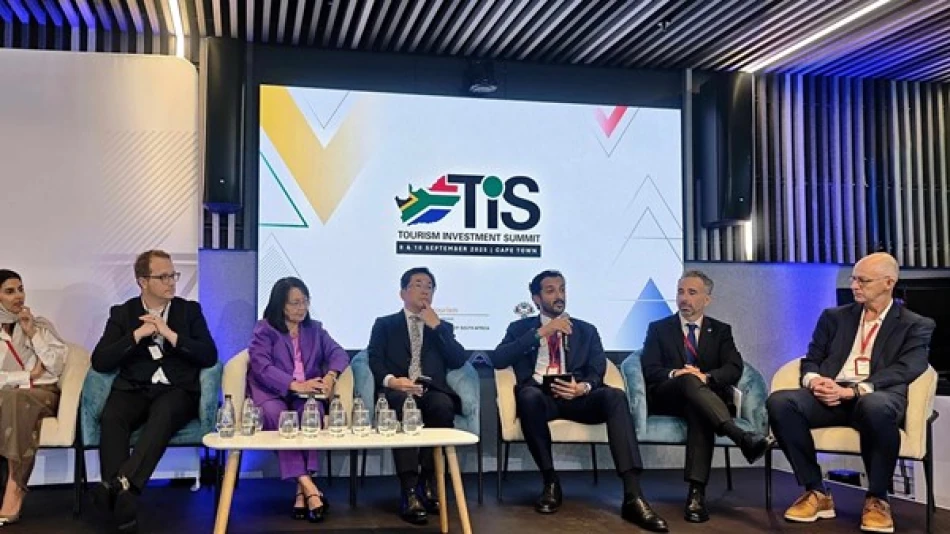
UAE Shines at 'African Tourism Investment Summit' in South Africa
UAE Positions Itself as Tourism Investment Hub in Africa Push
The UAE is aggressively expanding its tourism investment footprint across Africa, leveraging its proven hospitality model to tap into the continent's underexploited tourism potential. At the inaugural African Tourism Investment Summit in South Africa, UAE Economy and Tourism Minister Abdullah bin Touq outlined ambitious plans that could reshape regional tourism flows and investment patterns, with the Emirates targeting AED 35.2 billion in tourism investments by 2025.
Strategic Timing Amid Africa's Tourism Renaissance
The UAE's African tourism push comes at a pivotal moment. While global tourism recovered from pandemic lows, Africa remains significantly underinvested relative to its natural assets—from pristine coastlines to rich cultural heritage sites. This investment gap presents a compelling opportunity for UAE developers and hospitality groups, who have mastered the art of transforming desert landscapes into world-class destinations.
Bin Touq's participation in the G20 and World Travel & Tourism Council dialogue signals the UAE's intent to position itself as the primary gateway and investment partner for African tourism development. This mirrors successful strategies employed in Southeast Asia, where Gulf capital has transformed destinations like the Maldives and parts of Indonesia.
The Numbers Behind UAE's Tourism Ambitions
The UAE's tourism sector demonstrated exceptional resilience and growth, contributing AED 257.3 billion ($70.1 billion) to GDP in 2024—representing 13% of the national economy. This marks a 3.2% increase from 2023 and a remarkable 26% jump compared to pre-pandemic 2019 levels, positioning the Emirates among the world's most tourism-dependent economies.
More telling is the investment trajectory: tourism investments surged from AED 28.8 billion in 2023 to AED 32.2 billion in 2024, with projections reaching AED 35.2 billion in 2025. This 22% two-year growth rate suggests the UAE is doubling down on tourism infrastructure and experiences.
Investment Hotspots and Digital Innovation
The minister highlighted several key investment areas that could serve as templates for African ventures: eco-tourism in natural reserves, family entertainment complexes, cultural centers, and MICE (meetings, incentives, conferences, exhibitions) facilities. Perhaps most significantly, the UAE is pioneering digital tourism transformation through smart platforms and virtual experiences—technologies that could leapfrog traditional tourism infrastructure in African markets.
Geopolitical Implications and Market Access
The UAE's African tourism strategy extends beyond pure commercial interests. By positioning itself as a "key development partner," the Emirates is leveraging soft power to strengthen diplomatic ties and secure market access across the continent. This approach has proven successful in Latin America and Asia, where UAE hospitality brands often serve as economic ambassadors.
The timing coincides with increased competition from Saudi Arabia's NEOM and Red Sea projects, suggesting a broader Gulf rivalry for tourism supremacy. However, the UAE's established aviation networks through Emirates and Etihad provide crucial connectivity advantages that African destinations desperately need.
Investor Perspective: Risks and Rewards
For international investors, the UAE's African tourism expansion presents both opportunities and challenges. The Emirates' track record in creating luxury tourism ecosystems in challenging environments—from Dubai's desert to Ras Al Khaimah's mountains—provides confidence in execution capabilities.
However, African markets present unique risks: currency volatility, political instability, and infrastructure gaps. The UAE's approach of combining private investment with government diplomatic support could mitigate these concerns, particularly for hospitality groups seeking diversification beyond saturated Middle Eastern markets.
The Sustainability Factor
Bin Touq's emphasis on sustainable tourism practices reflects growing investor and consumer demand for responsible travel options. The UAE's investment in eco-tourism and natural reserves could establish new industry standards for African tourism development, potentially attracting ESG-focused institutional investors who have largely avoided the region.
The minister's assertion that tourism investment value extends beyond GDP contribution to include job creation and skills development suggests a more holistic approach than traditional resort development models that often created economic enclaves with limited local benefit.
Looking Ahead: A New Tourism Corridor
The UAE has signed 38 memoranda of understanding and three executive work programs to enhance international tourism cooperation, creating a foundation for systematic African expansion. This institutional approach, combined with the Emirates' aviation connectivity and hospitality expertise, could establish a UAE-Africa tourism corridor rivaling traditional European-African links.
For African governments, UAE partnership offers access to capital, expertise, and crucially, tourist flows from high-spending Gulf and Asian markets. This diversification away from traditional European source markets could prove valuable as travel patterns continue evolving post-pandemic.
The success of this strategy will largely depend on the UAE's ability to adapt its luxury-focused model to Africa's diverse markets while maintaining the operational excellence that has made Dubai and Abu Dhabi global tourism benchmarks.
Most Viewed News

 Layla Al Mansoori
Layla Al Mansoori






